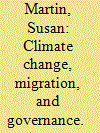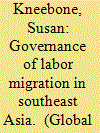|
|
|
Sort Order |
|
|
|
Items / Page
|
|
|
|
|
|
|
| Srl | Item |
| 1 |
ID:
098431


|
|
|
|
|
| Publication |
2010.
|
| Summary/Abstract |
There is growing recognition that the effects of climate change are likely to lead to more migration, both internally and internationally, in the relatively near future. These climate change-induced migrations are likely to pose new challenges to the international system, ranging from an increase in irregular migration, to strains on existing asylum systems, to protection gaps for certain migrants affected. Yet the legal and normative framework, and institutional roles and responsibilities, relating to climate change-induced migration remain poorly developed. This article provides an overview of the interactions between climate change and migration, outlines the current international response, and considers new approaches to the global governance framework.
|
|
|
|
|
|
|
|
|
|
|
|
|
|
|
|
| 2 |
ID:
098424


|
|
|
|
|
| Publication |
2010.
|
| Summary/Abstract |
WITH THE WORLD ECONOMY NOW SHOWING SOME FLEDGLING SIGNS OF
positive growth, the policy debate on the financial and economic crisis is
quickly shifting toward the shape and sustainability of recovery.1 Issues of
stimulus funding and retreat strategy, public debt and fiscal deficit, job creation,
rebalancing the world economy, and the like are dominating the global
agenda. The long litany of issues on the agenda does not, however, include the
postrecession challenge of migration and its governance. And so far policymakers
have taken little notice of it.
|
|
|
|
|
|
|
|
|
|
|
|
|
|
|
|
| 3 |
ID:
098426


|
|
|
|
|
| Publication |
2010.
|
| Summary/Abstract |
"THEMORE THINGS CHANGE, THEMORE THEY STAY THE SAME." THIS OFTENused
French proverb captures well how our world does migration policy today.
Ours is an interconnected world, where "going it alone" is fast becoming the
exception-the old way of doing business. Except for the migration world,
that is. In this world, going it alone seems to be the golden rule. It is a world
where national responses continue to trump globally shared ones.
|
|
|
|
|
|
|
|
|
|
|
|
|
|
|
|
| 4 |
ID:
098427


|
|
|
|
|
| Publication |
2010.
|
| Summary/Abstract |
This article explains how the global governance of international migration has evolved as a policy issue on the international agenda over the past decade while noting that there is still no consensus on whether global governance is really required, what type of global governance would be appropriate, and how it should develop. The article reviews a series of policy options that have been proposed to fill the governance gap in international migration; namely, to create a new agency, to designate a lead agency, to bring the International Organization for Migration into the UN system, a coordination model, a leadership model, a World Trade Organization model, and an evolutionary model.
|
|
|
|
|
|
|
|
|
|
|
|
|
|
|
|
| 5 |
ID:
098430


|
|
|
|
|
| Publication |
2010.
|
| Summary/Abstract |
This article examines the international governance framework for labor migration and evaluates the roles of international organizations, and regional strategies, for cooperation on governance of labor migration in Southeast Asia. It focuses on the mandates and strategies used by the two key international institutions in the region, the International Labour Organization and the International Organization for Migration, which have diverse origins and ideologies. The article considers the questions: Which institution is best suited to be lead agency in the region? How can the overlap between them be coordinated? Further, as a matter of law and policy, and in light of overlapping mandates and interests, how should international dialogue around migration issues be structured in the region?
|
|
|
|
|
|
|
|
|
|
|
|
|
|
|
|
| 6 |
ID:
098428


|
|
|
|
|
| Publication |
2010.
|
| Summary/Abstract |
When studying the institutional aspects of the global governance of refugee issues, scholars almost exclusively put the emphasis on the United Nations High Commissioner for Refugees, largely ignoring other organizations and the relationships established with these institutions. The aim of this article is to help fill this gap in the analysis by focusing on the historical roots of cooperation between UNHCR and the International Organization for Migration. Despite the fact that this relationship has been at times charged with competition and suspicion, it has also been a vital factor in the refugee arena over the past sixty years.
|
|
|
|
|
|
|
|
|
|
|
|
|
|
|
|
| 7 |
ID:
098425


|
|
|
|
|
| Publication |
2010.
|
| Summary/Abstract |
This article serves as the introduction for this special issue of Global Governance on international migration. It presents some of the key facts, figures, concepts, and debates on international migration that appear in the articles that follow, and outlines their main arguments. Five arguments in support of greater international cooperation and more formal processes of global governance on international migration are presented here. First, contemporary international migration is now occurring at unprecedented levels and has a truly global reach. Second, international migration can no longer effectively be managed or controlled by national migration policies, and greater international cooperation is required to achieve national goals in international migration. Third, there are growing numbers of migrants around the world who are vulnerable and exploited, and insufficiently protected by either states or international institutions. Fourth, emerging structural features in the global economy, alongside the effects of climate change, are likely to significantly increase the scale of international migration worldwide, and present new management and protection challenges. Finally, momentum for change is slowly developing.
|
|
|
|
|
|
|
|
|
|
|
|
|
|
|
|
| 8 |
ID:
098429


|
|
|
|
|
| Publication |
2010.
|
| Summary/Abstract |
The modern refugee regime, created in the aftermath of World War II, provides protection mainly to people who flee individualized persecution or generalized violence. Subsequent to its creation, a range of new drivers of external displacement-particularly related to the interaction of environmental change, livelihood collapse, and state fragility-have emerged that fall outside the framework of the regime. In order to examine institutional responses to these people, this article develops the concept of survival migration, which describes people who have left their country of origin because of an existential threat for which they have no domestic remedy. It examines six case studies of national and international institutional responses to survival migrants from Zimbabwe, Somalia, and the Democratic Republic of Congo (DRC), which fall outside the 1951 Refugee Convention. Based on a conceptual model of regime stretching, the article offers an explanation for variation in the extent to which the existing global regime has adapted to address survival migration in different national contexts.
|
|
|
|
|
|
|
|
|
|
|
|
|
|
|
|
|
|
|
|
|